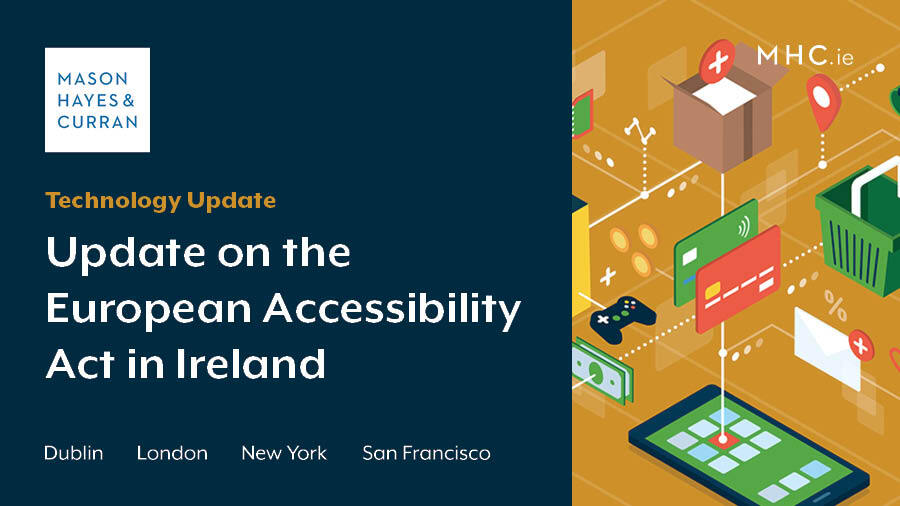Update on the European Accessibility Act in Ireland

The European Accessibility Act[1] (EAA) will introduce accessibility requirements for products and services across the European Union. As the EAA is a Directive, it needs to be implemented into national law in order to be effective. We consider Ireland’s progress in implementing the EAA and what businesses should be doing to prepare for it.
The EAA has broad application and will have significant implications for businesses in a range of sectors, including in particular banking, technology, media and transport services. One of the key in-scope services is ecommerce services, so any business selling online will need to be aware of, and address, the EAA.
Timing
The EAA was enacted in 2019 and will apply from 28 June 2025. We’ve previously outlined the EAA here, including the in-scope products and services and general accessibility requirements. The EAA has broad application and will have significant implications for businesses in a range of sectors, including in particular banking, ecommerce, technology, media and transport services.
EU Member States had until 28 June 2022 to transpose the EAA but a number of EU Member States, including Ireland, missed the deadline. This uncertainty can cause difficulties for businesses who are seeking to comply with EAA as they may be given a shorter window than is envisaged in the EAA to prepare for it coming into force. A similar situation arose recently in the area of consumer law when Ireland was late in implementing the Omnibus Directive which resulted in a very short period of time between the implementing legislation (the Consumer Rights Act 2022) being finalised and then being effective. This caught several businesses off guard who were awaiting finalised legislation before implementing processes and procedures to comply with it.
Despite Ireland and some other Member States missing the deadline for publication, the obligations under the EAA for in-scope products and services will still apply from 28 June 2025. This is a relatively short period of time considering that some of the changes which may be required to in-scope products/services are significant. The lack of Irish draft implementing legislation complicates matters as businesses may be reluctant to invest in upgrading their products and services when the final form of the Irish measures is unknown. However, as the EAA has quite detailed requirements from which implementing legislation is very unlikely to deviate, businesses should use the lead in time to carry out important preparatory work pending the publication of Ireland’s draft implementing measures.
To date, harmonised technical standards, which are envisaged in the EAA, have not yet been adopted. In December 2021, the European Commission published a draft standardisation request for harmonised standards based on the WCAG 2.1 guidelines, but this has not yet been finalised. In-scope products and services which comply with the finalised harmonisation standards are presumed to conform with the requirements of the EAA to the extent that this standard covers these requirements. Therefore the harmonised standards will be important for many businesses.
What businesses should be doing?
When assessing how the EAA will affect a business, we would recommend a careful review of its products and services is carried out to ascertain whether they are within the scope of the EAA and then, if so, for compliance with the EAA. The following considerations should form part of any review:
- Does the business provide products or services within the scope of the EAA?
- What role does your business play in relation to the product/service? There are different obligations for manufacturers, importers, distributors and service providers so it is important to determine what set of obligations will apply to your business.
- Are there any specific accessibility requirements for your in-scope products/services? While there are general accessibility requirements that will apply across the board, some products and services have specific requirements which they will need to meet to be compliant. For example, consumer banking services will need to provide ID methods, electronic signatures, security and payment services which are perceivable, operable, understandable and robust and information relating to these should be understandable and not complex.
- Are your products/services accessible? It is advisable that businesses assess their products/services with the WCAG 2.1 guidelines as part of this exercise.
Next steps
While we await draft implementing measures from Ireland, businesses should use this time to give careful consideration to the requirements of the EAA. Given that there are only two years left before businesses will be obliged to comply with legislation giving effect to the EAA and that changes required to goods and services could be significant, now is an opportune time to prepare and begin the journey to compliance.
For more information, contact a member of our Technology team.
The content of this article is provided for information purposes only and does not constitute legal or other advice.
[1] Directive 2019/882
Share this:



